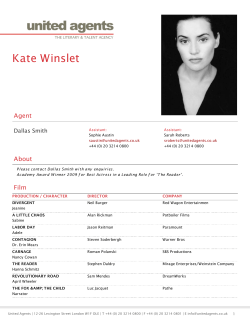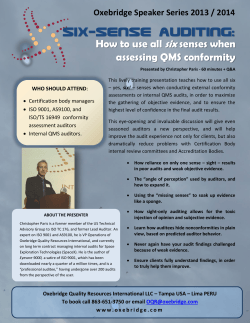
IRIS International Railway Industry Standard What is IRIS ?
IRIS International Railway Industry Standard A Quality Standard for the Railway industry ANIE - ASSIFER information session Milan, 11th July 2006 Giuseppe Greco UNIFE What is IRIS ? IRIS - International Railway Industry Standard IRIS stands for International Railway Industry Standard. IRIS aims at developing and implementing a common global system for the evaluation of Business Management Systems specific to the railway industry, including: One internationally recognized standard based on the key principles of ISO 9001 and specific to the railway industry; One harmonized evaluation process to be performed by approved certification bodies; A web-based IRIS Portal (common database) and Audit-Tool (software). 2 1 Why IRIS ? IRIS - International Railway Industry Standard Operators have complained about the quality of some Rolling Stock and requested to improve the quality of the Supply Chain. Railway equipment manufacturers have complained about the number of different requirements and audits from Rolling Stock Manufacturers and requested rationalization. IRIS is an answer to these requests 3 The Challenge IRIS - International Railway Industry Standard The goal of IRIS is to improve the quality of the railway industry supply chain. The systems aims at a global recognition and acceptance of audit results, the avoidance of multiple auditing and therefore increased cost efficiency. Audit records and audit results will be collected and stored in a central database. IRIS will enable high quality in audits. 4 2 The Guiding principles IRIS - International Railway Industry Standard The development of the standard is transparent and involve all market participants via UNIFE. The standard is owned and managed by UNIFE (ensure independency). Audit results are traced confidentially and published only with allowance of the Audit Client. Rules for protection of data privacy will be followed. Approval of certification bodies is fair and transparent. 5 Benefits IRIS - International Railway Industry Standard Improved product quality & supply chain efficiency. Reduction of effort and cost. More accurate and reliable Information about suppliers to the railway industry. Fair evaluation by independent certification bodies. It’s a win - win situation for all those concerned 6 3 The Standard (1/3) IRIS - International Railway Industry Standard Is based on the ISO 9001 Structure. IRIS adds a layer, which contains railway specific requirements for the Business Management System, e.g. Project Management, Design, etc… IRIS contains: Mandatory requirements with «Shall» wording. Optional requirements with «Should» wording. Some requirements are “KnockOut” criteria. 7 The Standard (2/3) IRIS - International Railway Industry Standard 0. Foreword 1. Scope 2. Normative Reference 3. Terms and Definitions 4. Quality Management System 5. Management Responsibility 5.1 Management commitment 5.2 Customer focus 5.3 Quality Policy 5.4 Planning 5.5 Responsibility, authority & communication 6. Resource Management 4.1 General Requirements 6.1 Provision of resources 4.2 Documentation Requirements 6.2 Human resources 4.3 Knowledge management 6.3 Infrastructure 4.4 Management of multi sites projects 6.4 Work Environment 8 4 The Standard (3/3) IRIS - International Railway Industry Standard 7. Product Realization 8. 7.1 Planning Measurement, analysis and improvement 7.2 Customer related process 8.1 General 7.3 Tender Management 8.2 Monitoring and measurement 7.4 Project Management 8.3 Control of nonconforming products 7.5 Design & development 7.6 Configuration Management 8.4 Control of nonconforming processes 7.7 Purchasing 8.5 Analysis of data 7.8 Production & Service provision 8.6 Improvement 7.9 Commissioning / Customer service 7.10 RAMS / LCC 7.11 Control of monitoring & measuring devices 9 Evaluation methodology IRIS - International Railway Industry Standard Audit results are scored, its not a fail/pass system Questionnaire has 253 questions : - 111 questions relative to ISO Requirements - 142 questions relative to IRIS Requirements 10 K.O. questions, not scored, fulfilment mandatory 32 Closed questions Yes/No question 211 Open questions scored using maturity levels Threshold Section score ≥ 50% of maximum possible score Global score ≥ 50% of maximum possible score 10 5 What makes the difference to ISO? IRIS - International Railway Industry Standard 1. additional railway specific requirements, e.g. such as Knowledge management Communication management Management of multi sites projects Risk and opportunity management Requirements management Change management Competences, awareness and training First article inspection Configuration management Infrastructure management Outsourcing (Make or Buy) Tender management Supply chain management Integration management Commissioning / Customer service Scope management RAMS / LCC Time management Cost management Control of nonconforming processes .... IRIS - International Railway Industry Standard 11 What makes the difference to ISO? 2a. Assessment methodology 7.4 Project m anagem ent Knock-Out & process Does the organization implement a project management (PM ) or new product development process addressing the applicable areas of PM , describing roles and responsibilities, int egrat ing t he whole funct ions of t he organisat ion in a multidisciplinary team? De K.O. QUESTION The organization has defined crit eria for project / non-projects business including appropriat e procedures. New product development has to be run as project. Projects have defined roles and responsibilities f or the act ors; integrat ing the whole funct ions 13 procedures to be documented (ISO 9001: 6) 19 processes required (ISO 9001: 3) 12 6 What makes the difference to ISO? IRIS - International Railway Industry Standard Clause 2b. Maturity levels & scoring 7.3 POOR (1 point) Question DEFINED (2 points) QUALIFIED (3 points) OPTIMIZED (4 points) Tender m anagem ent How are risks related to the product reviewed? Does the organization has a multidisciplinary approach prior to commitment to start the quotation process? OPEN QUESTION - Process defined and implemented. - multi-disciplinary approach, prior to the submission of the quotation and records maintained As a minimum, are project / product requirements identified, controlled and validated? Plus: - formal review and defined process available - risks are continuously monitored, updated Plus: The effectiveness of the risk assessment was analysed on a regular basis Plus: Continuous improvement of the risk assessment process including tools Identification of requirements as before formal validation processformal approval process CLOSED QUESTION ∑ of points / max points ≥ Threshold (~ 50 % ) 13 What makes the difference to ISO? IRIS - International Railway Industry Standard 3. Corrective or improvement actions Concluding the answers of each individual requirement (question) there might be corrective or improvement actions required. Therefore the following scheme shall be applied: Compliance Level Actions requested Points open question Compliant Non Compliant optimized 4 no specific action expected qualified 3 improvement action might be expected defined 2 improvement action requested; to be closed within 12 months poor 1 corrective action requested; to be closed within 90 days insufficient 0 corrective action requested; to be re-audited within 90 days closed question no specific action expected corrective action requested; to be re-audited within 90 days 14 7 IRIS - International Railway Industry Standard What makes the difference to ISO? 4. Compensative and rewarding approach Once certified, the client has to undertake so-called surveillance audits on a regular basis, however a minimum of once per year. Following compensative and rewarding approach will apply for audited organizations with a global score of ≥75%: IRIS requirements main clauses scoring individually ≥80% - will not be audited during surveillance audits - will be dealt with only during the re-certification process (after 3 years) IRIS requirements main clauses scoring individually between 75% and 80% - will be partially audited with the purpose to improve the related processes and achieve 80% scoring. 15 IRIS - International Railway Industry Standard What makes the difference to ISO? 5. Requirements to auditors (experiences/examination) Auditors shall comply with ISO 19011 Auditing Experience: Auditors shall have participated in at least 4 certification audits or for a minimum of 20 audit days covering all the requirements of ISO 9001 within the last 4 years. Work Experience: After the implementation phase, new IRIS auditors shall have a minimum of 3 years railway industry experience in the last 10 years. Railway Certification: Auditors shall have passed the IRIS training and examination. Communications skills Basic English & local language. 16 8 IRIS - International Railway Industry Standard What makes the difference to ISO? 6. Certification Body may only carry out audits in the areas of the particular railway equipment in which its Auditors are approved. First level 1 Car body 10 Passenger Information Systems 2 Car body fittings 11 Communication systems 3 Guidance (Bogies and running gear) 12 Cabling and Cabinets 4 Power System 13 Door System 5 Propulsion 14 HVAC 6 Auxiliary systems 15 Tilt System 7 Braking System 16 Lighting 8 Interiors 17 Coupler 9 On board vehicle control 17 IRIS - International Railway Industry Standard What makes the difference to ISO? 7. Availability / maintenance of information IRIS web portal http://www.iris-rail.org/ provides valuable information about, e.g.: IRIS approved Certification Bodies IRIS Certificates (list of companies, scope and validity) Auditor performance (access restricted to CBs) Audit results (reports, scores, corrective action plans, incl. status; access restricted) supports sales/distribution of IRIS booklet and data transfer via XLM data export interface IRIS audit tool contains the IRIS questionnaire and supports audit execution and reporting Automatically transfers audit results into the web portal 18 9 The Organization IRIS - International Railway Industry Standard UNIFE Presiding Board IRIS Steering Committee IRI IRIS Management Centre (UNIFE) Rules of Procedure Approval & Contract permanent or ad hoc IRIS Working Groups Certification Body 1 * IRIS Discussion forum Certification Body x * * Accredited for ISO and approved for IRIS Client 3 Client 2 Client 1 Client 4 Client 5 Request for Certification Client n 19 IRIS Steering Committee Members IRIS - International Railway Industry Standard 20 10 Role of the IRIS Steering Committee IRIS - International Railway Industry Standard Development and implementation of the IRIS System, including International standard Evaluation process with an audit and scoring methodology Global database Admittance and removal of members Cooperation with other organization/associations Approval of certification bodies Setting up Working Groups Setting up and monitoring the IRIS Management Centre 21 Role of the IRIS Management Centre IRIS - International Railway Industry Standard Implementing and promoting of IRIS System Setting up, administrate and maintaining IRIS website IRIS database IRIS audit software Contracting and monitoring certification bodies Organizing of IRIS information sessions and seminars Managing the day-to-day operation and activities: Administrates the standard and training material Administrates the IRIS database 22 11 Certification Bodies IRIS - International Railway Industry Standard 23 Requirements to Certification Bodies IRIS - International Railway Industry Standard ISO 9001 accreditation and IRIS approval consent to framework agreement: 1. At least 25 certificates specific to the railway industry 2. Global presence 3. Capability and experience in the railway industry 4. Availability of experienced auditors Mutual recognition of IRIS certificates between approved certification bodies (to enable issuing of corporate certificates for multi-site organizations) Acceptance of « witness audits » Execution of IRIS in-house training/examination by certification bodies 24 12 IRIS Benefits (1/2) IRIS - International Railway Industry Standard One demanding International recognized Standard for the Railway Industry. Reduction of non conformity costs due to suppliers deficiencies => IRIS will support the manufacturers and the suppliers in improving their process quality continuously. Increase the number of approved suppliers => whilst stopping of audits performed by internal resources. 25 IRIS Benefits (2/2) IRIS - International Railway Industry Standard Reduction of efforts in terms of time and expenses for approving suppliers => Thus enhance focus on supplier performance and on specific product requirements. Reduction of costs for maintaining the “approved supplier lists” in ERP systems. => They will become obsolete. In future, the data will be maintained on one common IRIS web database. Improvement of Quality of Equipments & Rolling Stock 26 13 Your contact IRIS - International Railway Industry Standard IRIS Management Centre UNIFE Avenue Louise, 221 1050 Bruxelles Belgium Michael Wix Giuseppe Greco Judit Sandor Tel: +32 2 626 12 60 Fax: +32 2 626 12 61 Mail: iris@unife.org Web: http://www.iris-rail.org/ 27 14
© Copyright 2025









